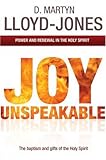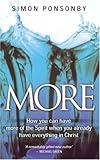 This book contains 24 sermons from Martyn Lloyd-Jones on the Baptism of the Holy Spirit. Lloyd-Jones is of course well known and highly regarded in evangelical circles for his outstanding preaching gift. However, the position he argues for in this book is a controversial one, particularly amongst those who otherwise would agree with his every word.
This book contains 24 sermons from Martyn Lloyd-Jones on the Baptism of the Holy Spirit. Lloyd-Jones is of course well known and highly regarded in evangelical circles for his outstanding preaching gift. However, the position he argues for in this book is a controversial one, particularly amongst those who otherwise would agree with his every word.
In this book, Lloyd-Jones builds a biblical case that the Baptism of the Holy Spirit is a distinct experience from conversion. He sees it as the most urgent need for the church of the present day to be baptised in the Spirit, which he believes is the same thing as saying that we need revival.
The first chapter establishes his conviction that the baptism or “sealing” with the Spirit is distinct from conversion. Amongst many examples he gives, he points to Jesus’ own experience of being baptised with the Spirit. He is keen to emphasise the experiential nature of the baptism – it is a kind of “drenching” with the Spirit.
The chief marks of the baptism he highlights are a great joy, a real assurance, and power for witness. He does not believe that it is directly related to sanctification, although it is of course a great encouragement to growth in holiness. He urges those who do not have “joy inexpressible” to seek the baptism. He does not believe that the baptism can only be received once.
Pentecostals and charismatics however should not assume he is uncritically “on their side” in this debate. Though he rigorously refutes cessationism, he also critiques certain charismatic ideas as well. Perhaps most notable is his stress on the sovereignty of God in giving the baptism and gifts. He rejects any assumption that you simply have to follow certain steps to receive them, or that they can be “claimed”. He is highly suspicious of anything that could be interpreted as psychological manipulation or the power of suggestion. Instead he urges people to earnestly seek to receive the baptism, but at the same time indicates that we cannot force God’s hand.
He manages to show tremendous balance throughout. He is aware of the danger of quenching the Spirit on the one hand, and of gullibly being led into error on the other, and is equally forceful in warning against both. Perhaps most impressive is his determination to follow the Scriptures wherever they lead, even if that put him at odds with many of those who moved in the same reformed evangelical circles. He was determined not to interpret Scripture in light of our experience, but to evaluate our experience (or lack of it) in the light of Scripture.
Throughout the book, he illustrates his points with stories of people throughout history who have met with God in remarkable ways. Some have criticised him for making the baptism seem “out of reach” to ordinary people by focussing on these particularly exceptional examples. But that would be slightly unfair, since he takes pains to point out that this experience is available to all kinds of people, even those with the most level-headed of dispositions. Others criticise his emphasis on the sovereignty of God by appealing to Luke 11:13 as a promise that we will receive when we ask. However, he does address this concern, and again it is his determination that we settle for nothing less than the real thing that prevents him from endorsing various charismatic attempts to guide people into receiving the experience.
Although this is quite a long book, I would say it remains essential reading for those wanting to fully examine the biblical evidence on the matter of the baptism of the Holy Spirit. He shows how almost all the evidence in the gospels and Acts points in this direction, and is willing to interact with all the counter-arguments that are usually raised (including 1 Cor 12:13). Most importantly though, it stirs up a hunger to personally receive more of the Spirit, and calls us to earnest prayer for our churches to experience true revival.




